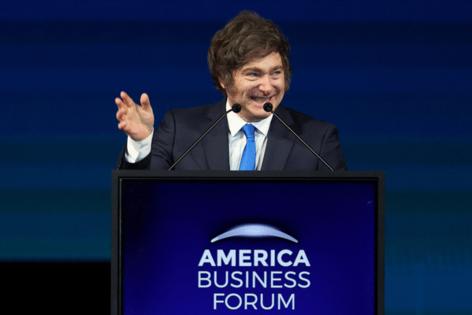Milei defends capitalism, urges investment in Argentina at Miami business forum
Published in News & Features
MIAMI — Argentine President Javier Milei defended capitalism earlier this week as “the only morally just system” and urged international business leaders to invest in Argentina during a speech at the America Business Forum held in Miami.
Introduced as “a social media star turned president of a divided nation,” Milei thanked Miami Mayor Francis Suarez for the invitation and highlighted the presence of President Donald Trump, whom he described as “a personal friend and a friend of Argentina,” as well as soccer star Lionel Messi, whom he praised as an example of effort and merit.
Milei devoted much of his address to a philosophical and economic defense of free markets, arguing that capitalism “is not a necessary evil” but the natural consequence of human freedom. “The fundamental right is to own the fruits of one’s labor and freely dispose of one’s tim:. From that freedom derives private property,” he said.
The Argentine president criticized the idea that governments should intervene to correct inequality or prevent monopolies. “For more than a century, that vision has won elections in America and Europe and has led to the continuous expansion of the state until it controls people’s lives,” he said.
Milei compared such policies to communist experiences of the 20th century, citing Cuba as an example. “Fidel Castro promised social justice and democracy, and ended up imposing a dictatorship that lasted more than 50 years,” he said.
According to Milei, interventionist models “generate poverty and destroy the incentives for progress.” In contrast, he said, capitalism “is the form that true justice takes in this world, because it is based on respect for freedom and property.”
Milei also used the forum to highlight his administration’s accomplishments and his coalition’s recent legislative election victory, which he described as “a ratification of the model of freedom and fiscal order.”
“The Argentine people chose between two paths: freedom, or the servitude of deficit and money printing. They chose freedom,” he declared. He added that markets reacted favorably to the election results, with a historic surge in Argentine stocks and a drop of more than 400 points in the country’s risk index.
“In just 10 months, we achieved Argentina’s first fiscal surplus in over a decade, reduced inflation, and stabilized the economy without printing money or increasing debt,” he said, acknowledging that the adjustment process has had social costs.
The president outlined an optimistic outlook for Argentina’s economic future, noting that the country “has the same number of cattle as 30 years ago,” and unlike Chile, “still does not export copper on a large scale,” despite having comparable reserves.
He projected that oil and gas revenues could reach as much as $40 billion annually by 2031, driven by developments in the Vaca Muerta shale formation and new offshore projects.
According to Milei, more than $100 billion in new investments have been announced in the past year, with more than half already in various stages of approval. “Argentina is awakening to the world and to the market,” he said.
Milei added that starting in December, Argentina will have “the most reformist Congress in its history,” with his political movement in a position to sustain presidential decrees and vetoes.
His priorities include a labor modernization plan to boost formal employment, tax cuts and deregulation to reduce costs, and a criminal reform aimed at strengthening security and the protection of private property.
“In the new Argentina, those who commit crimes will pay for them. There will be no minimum amount of theft that goes unpunished,” he said.
In closing, Milei made a direct appeal to investors. “Come and invest in Argentina. Be part of the demonstration of the power and moral superiority of capitalism,” he urged.
He said his government aims to build a nation “founded on the principles of freedom, property, and respect for the law,” and insisted that the ongoing reform process “has no turning back.”
“We are living a national redemption. Argentines have decided to be free once again,” he concluded, ending his speech with his signature rallying cry: “Long live freedom, damn it!”
©2025 Miami Herald. Visit miamiherald.com. Distributed by Tribune Content Agency, LLC.







Comments